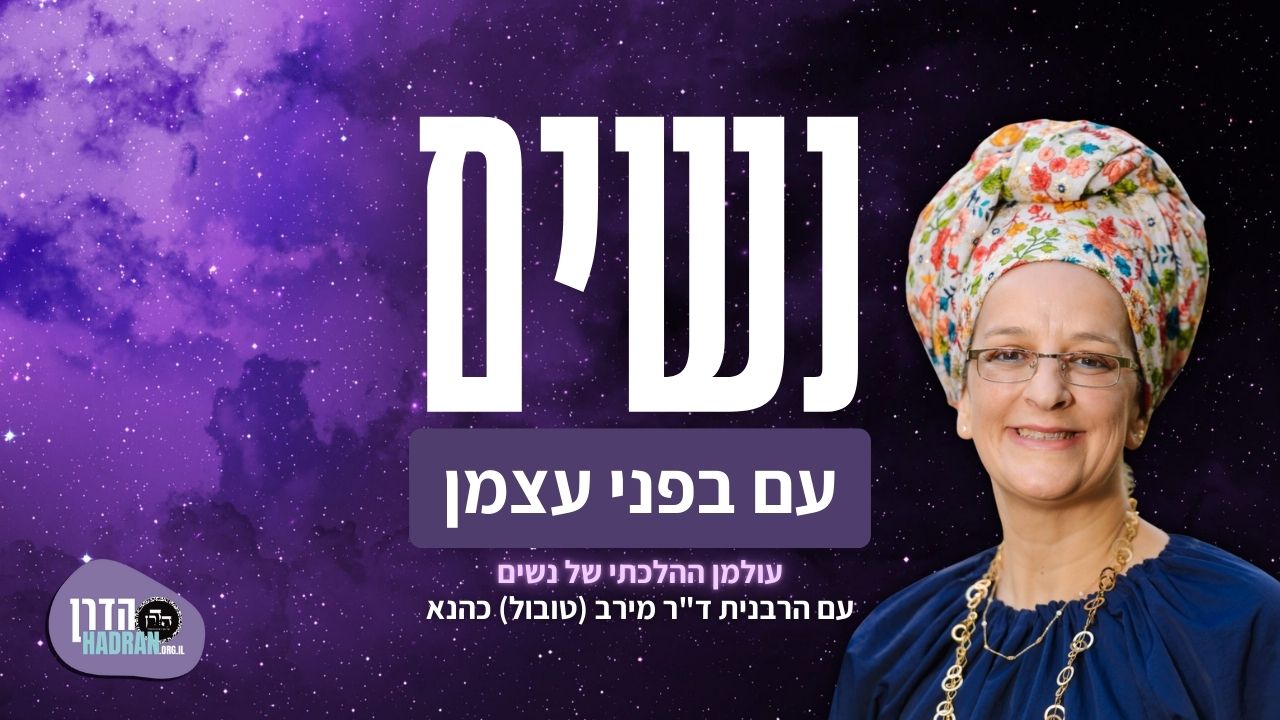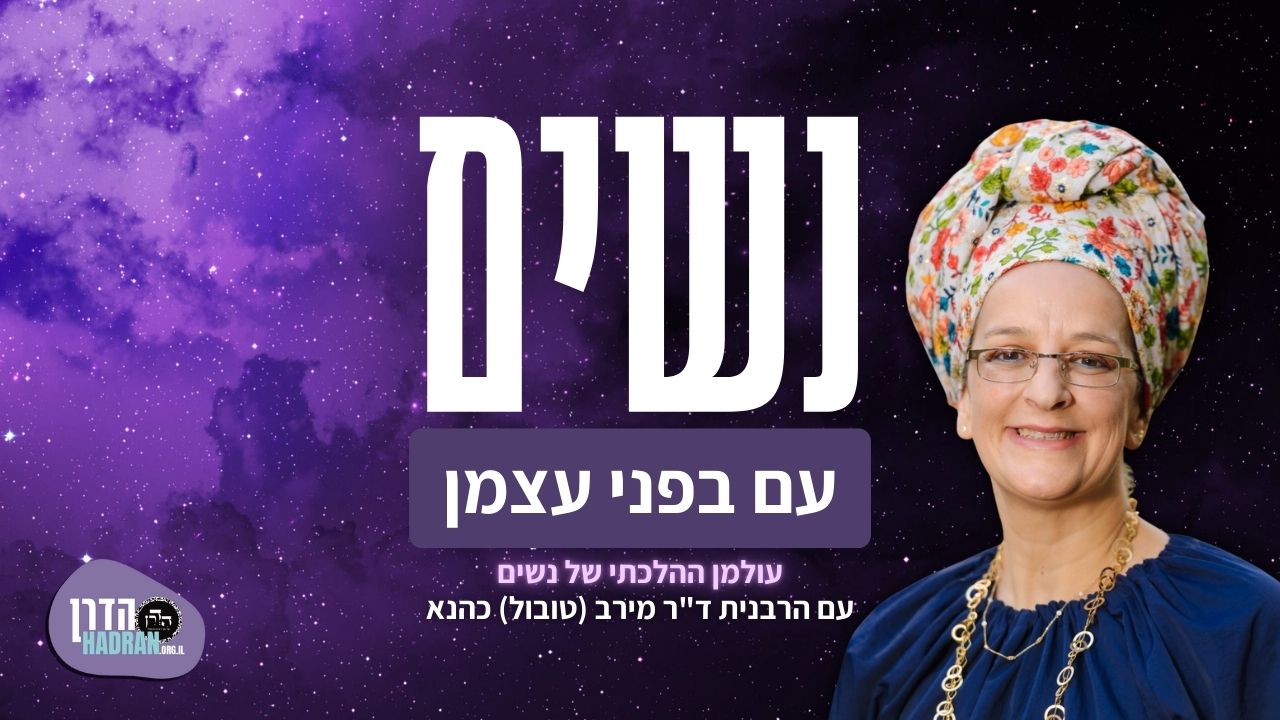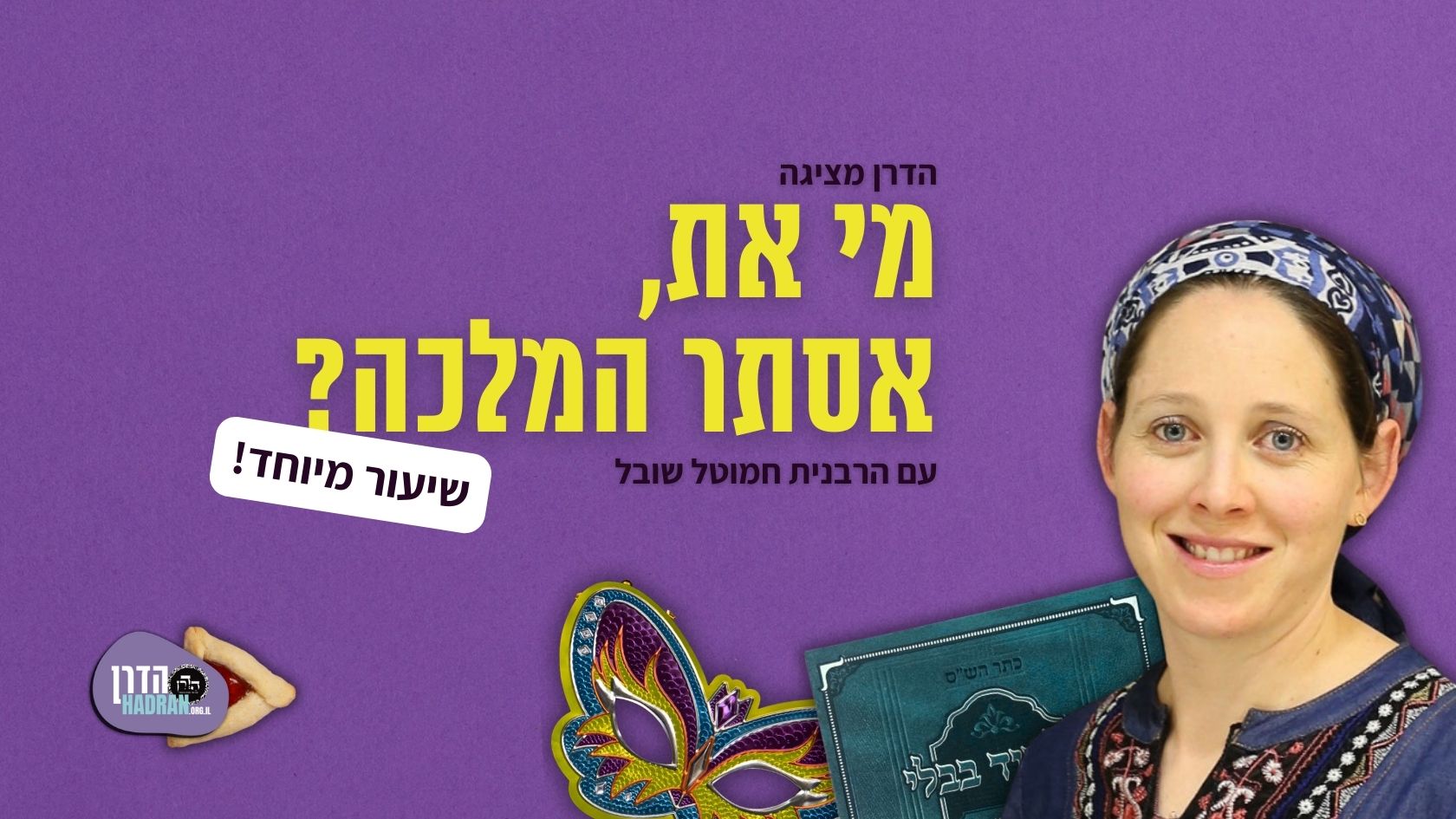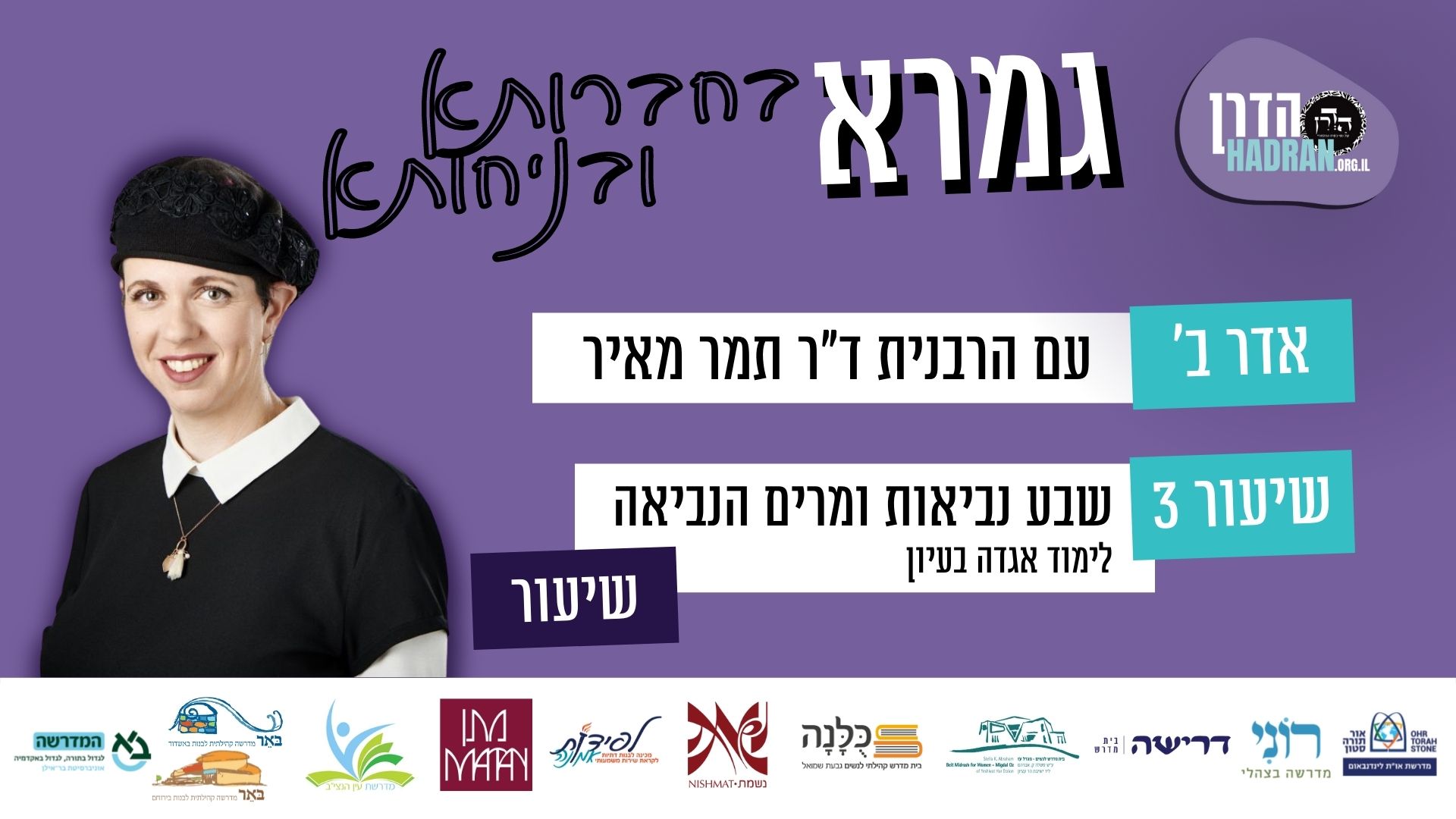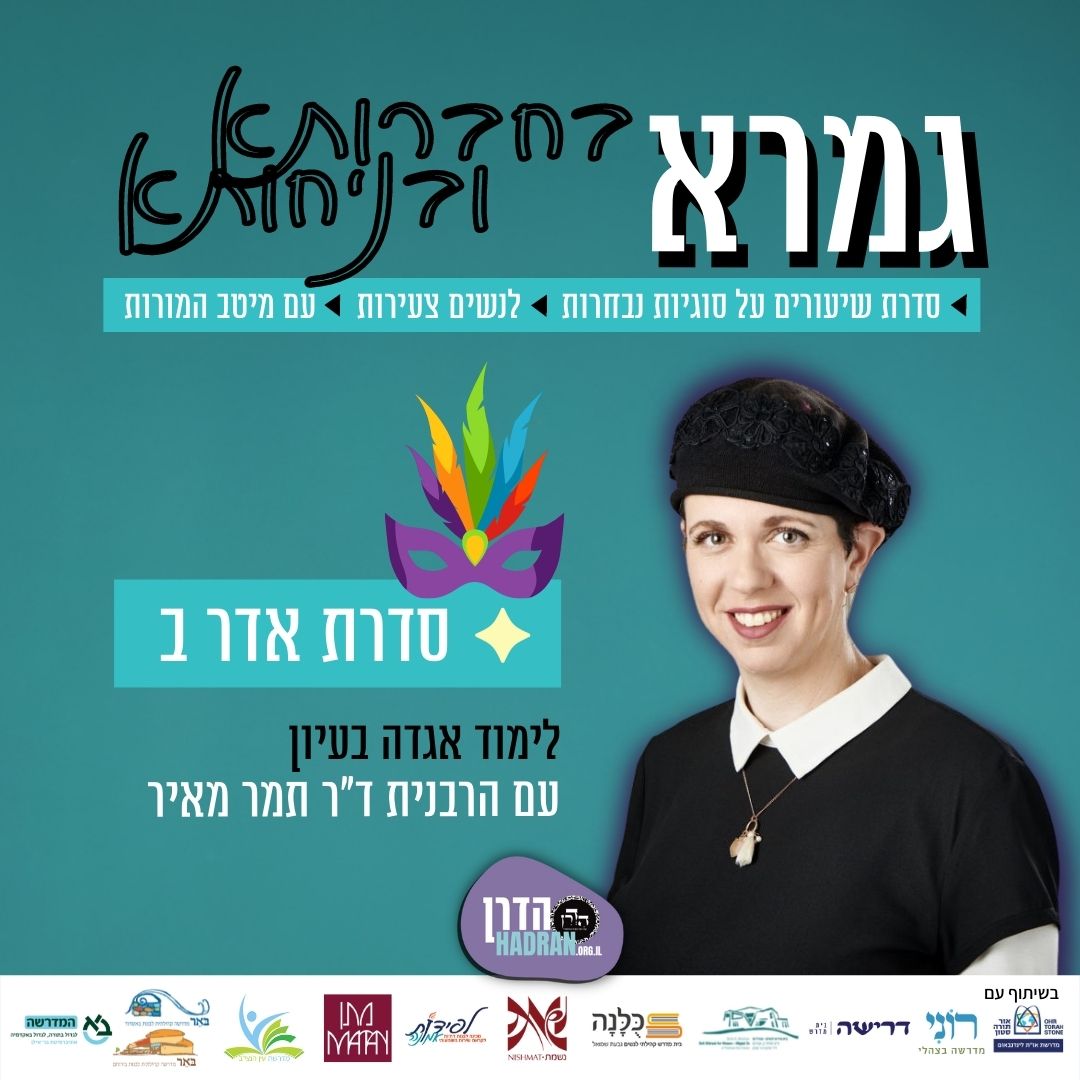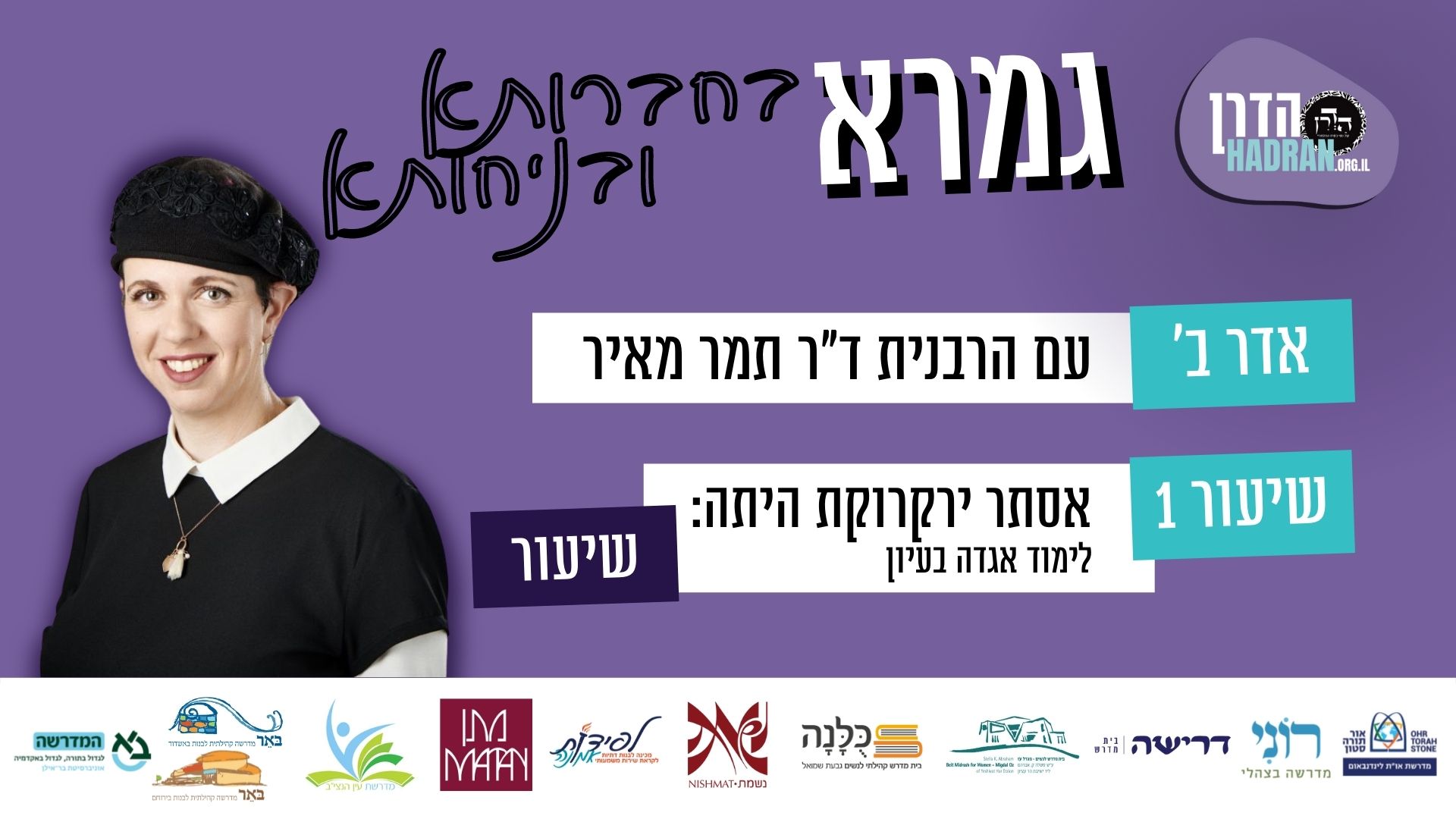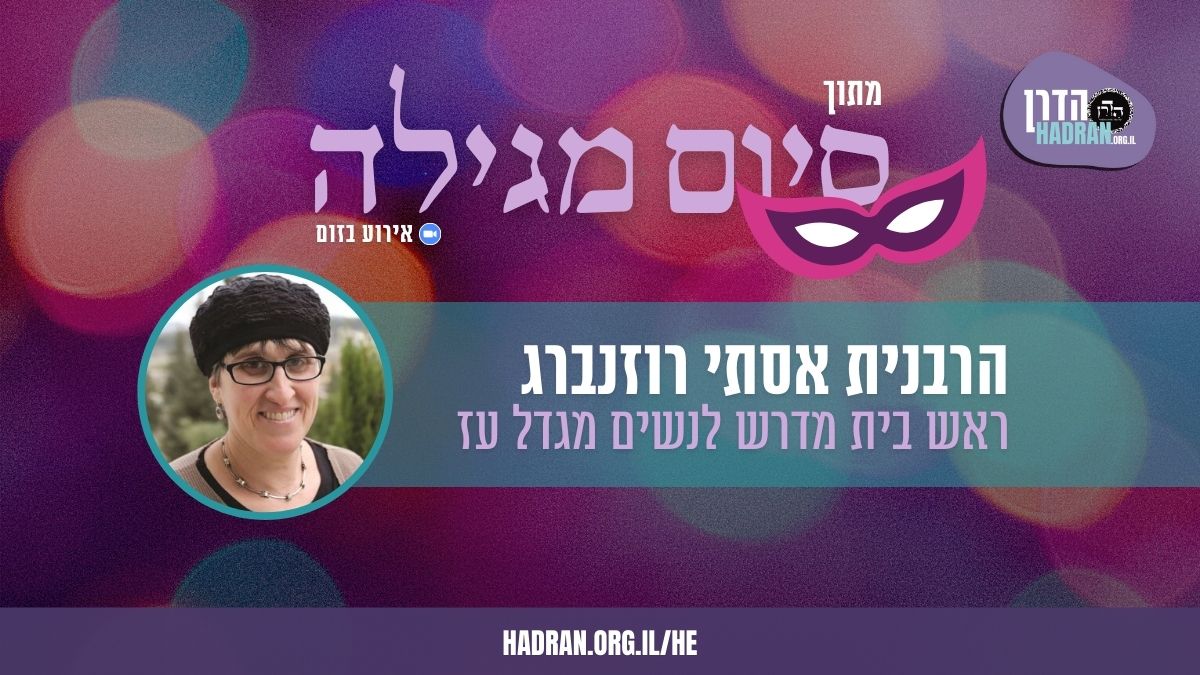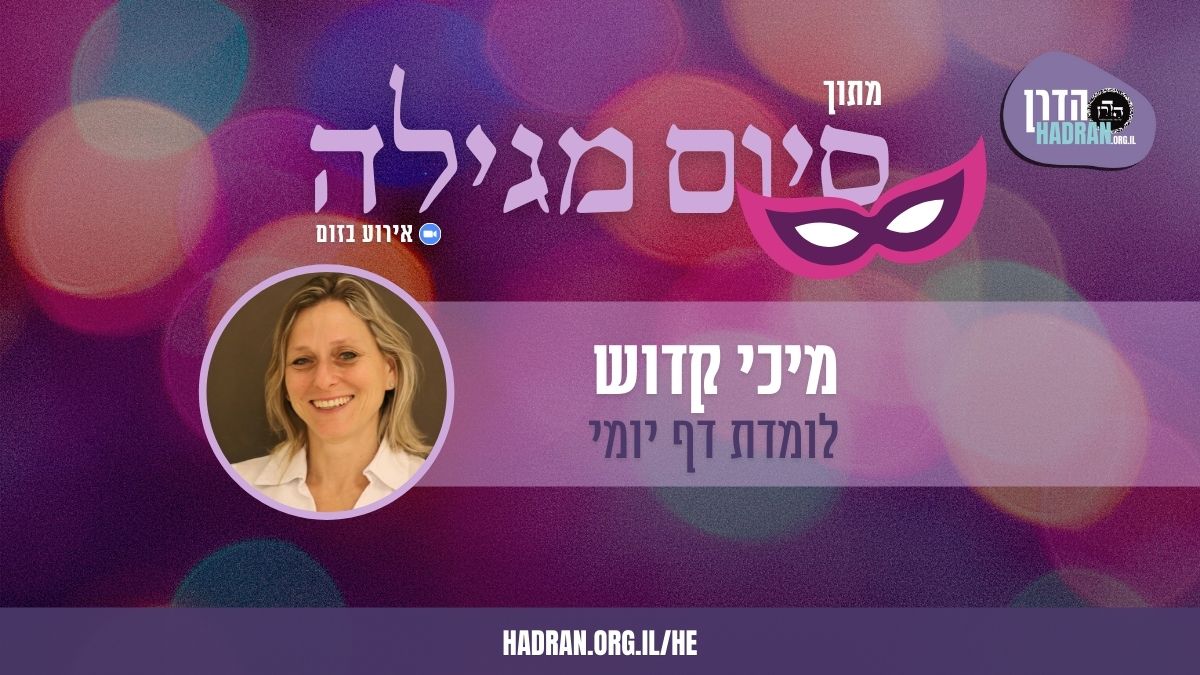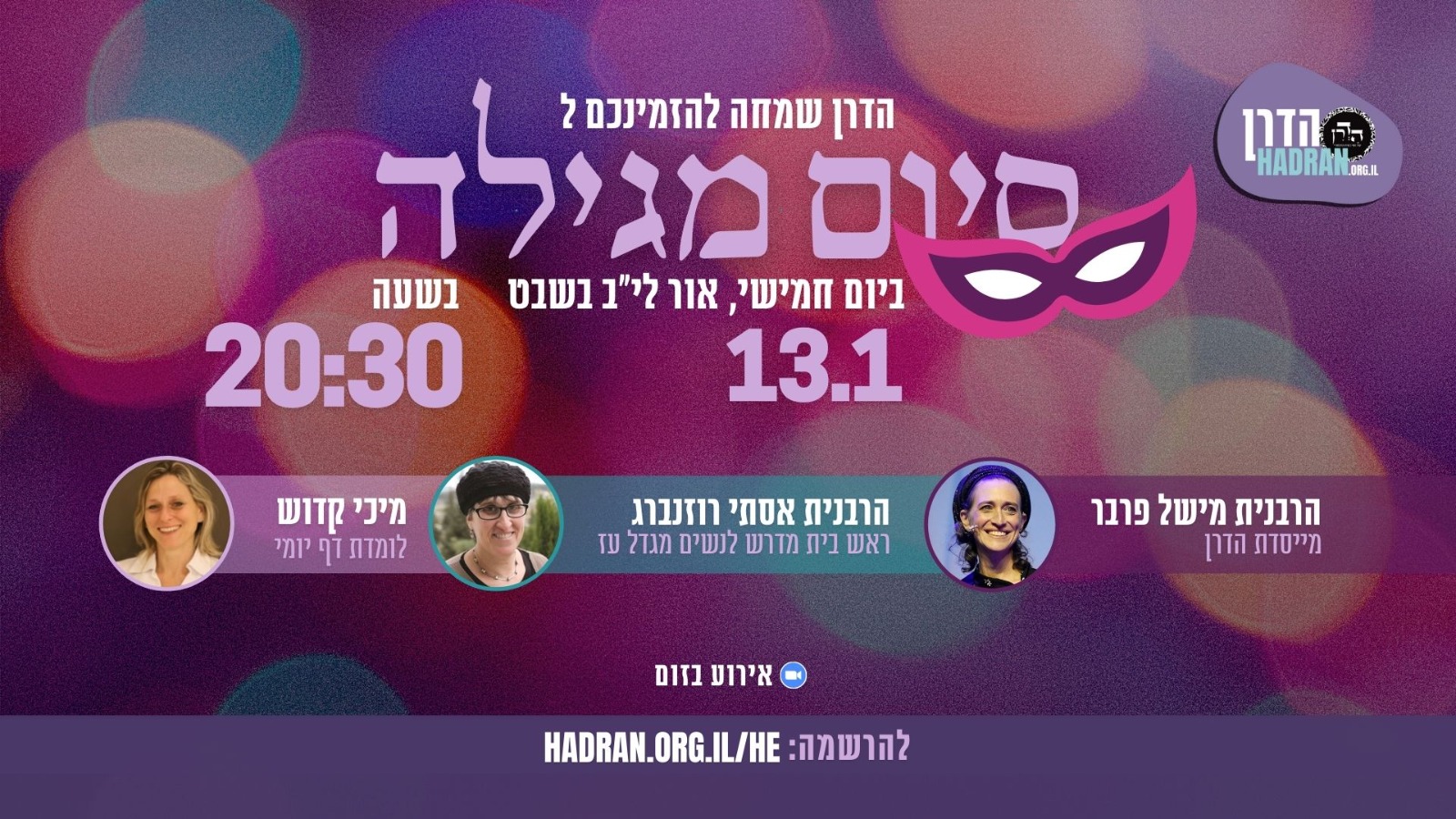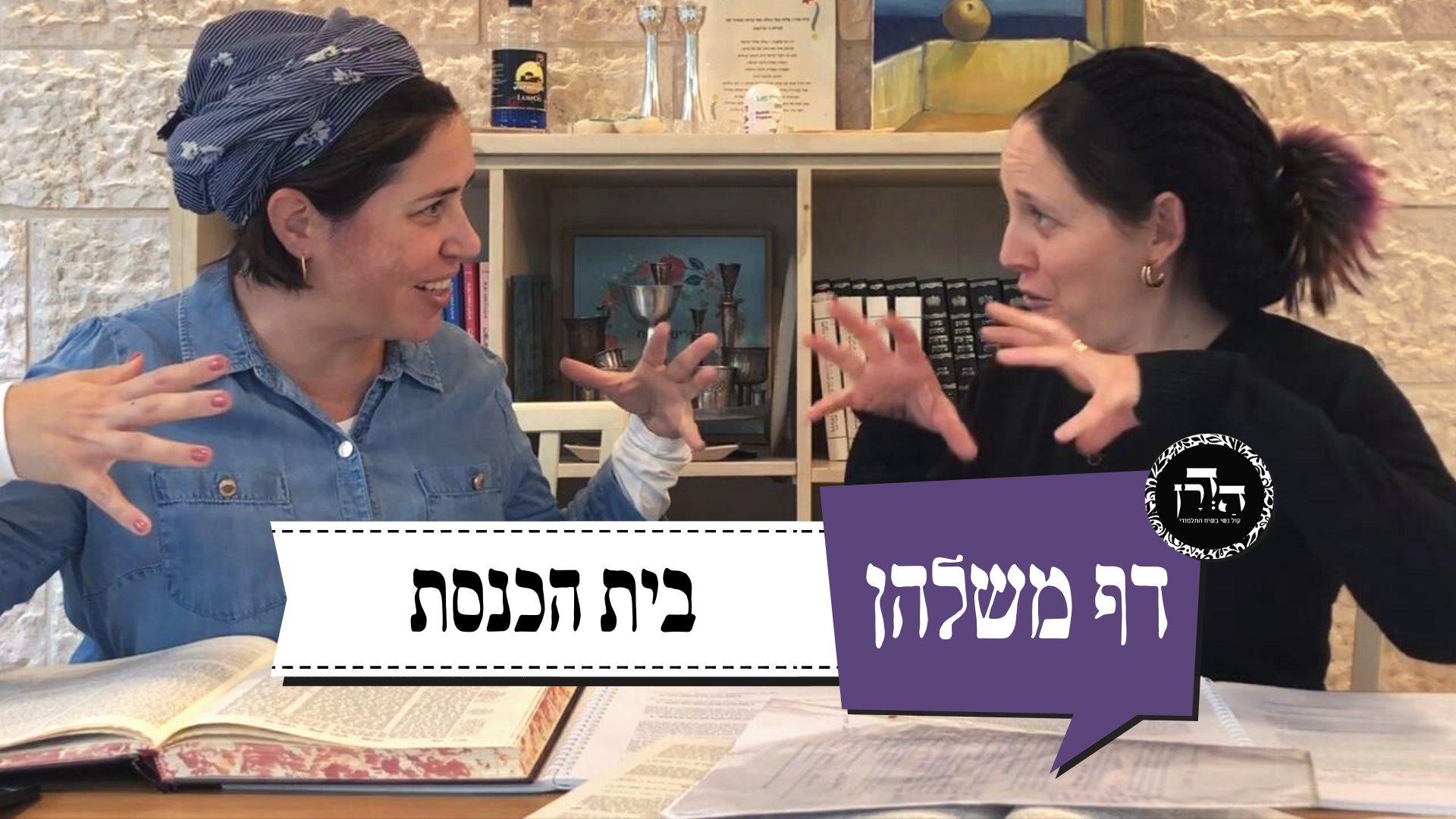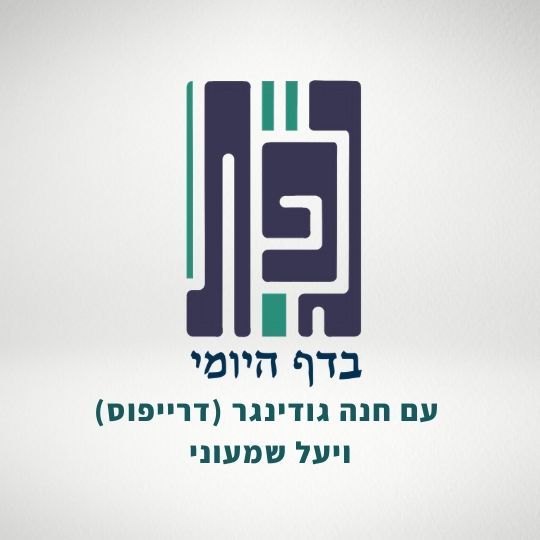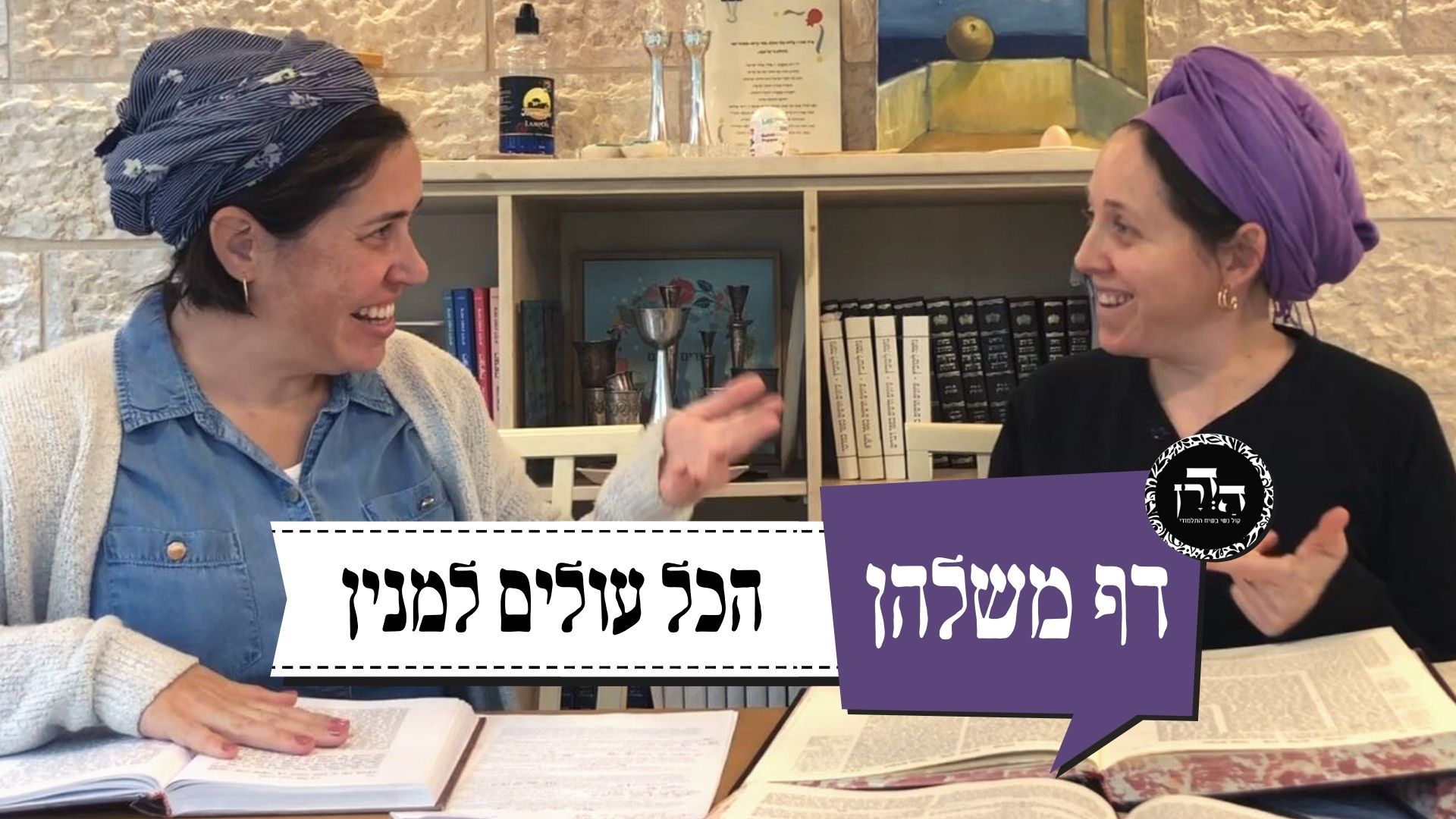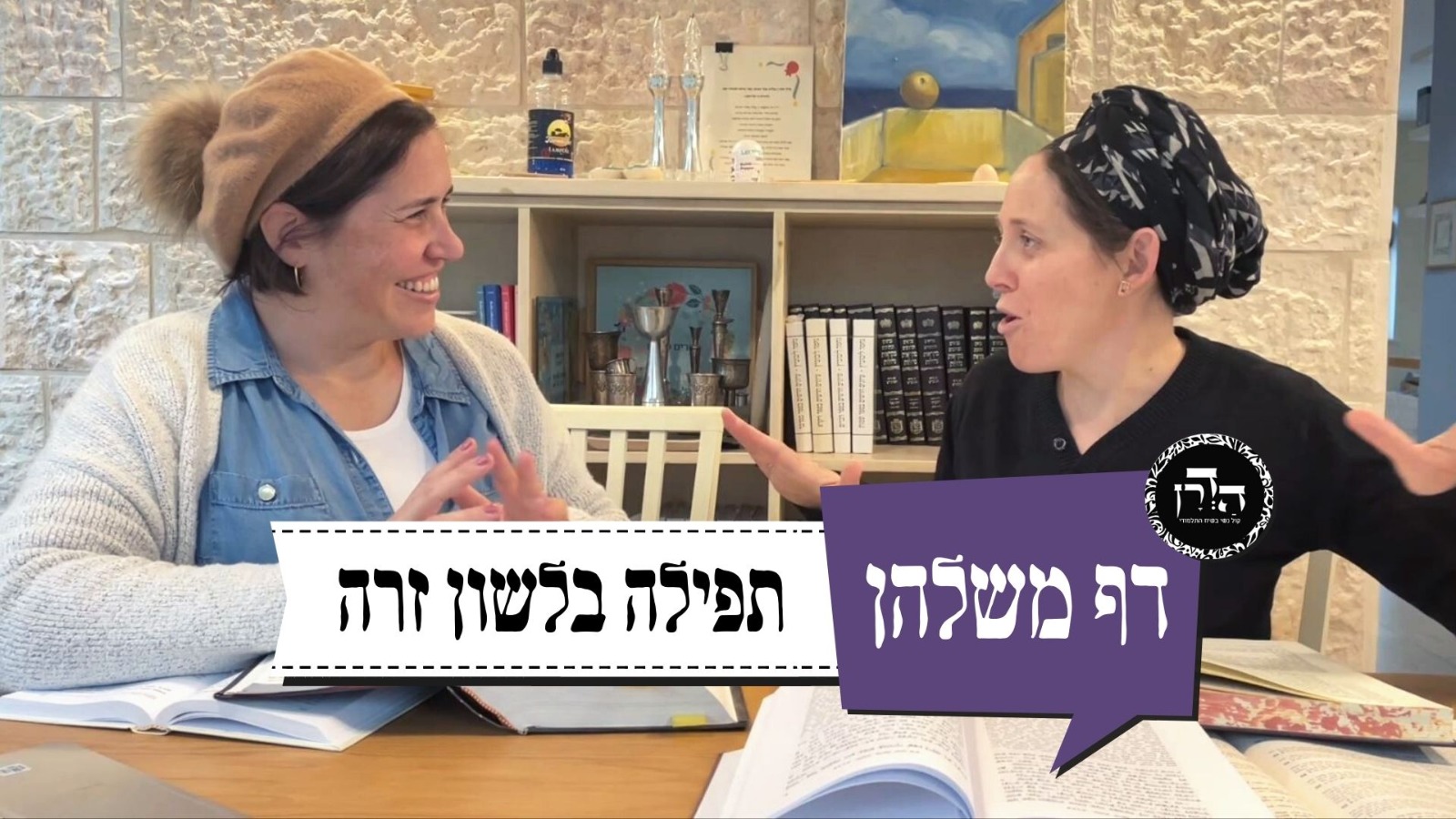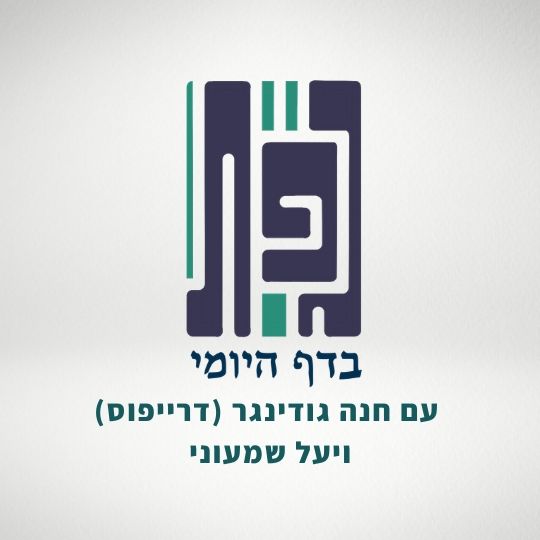מגילה ו
וְאִישְׁתְּכַח כְּווֹתִי. חַמַּת זוֹ טְבֶרְיָא, וְלָמָּה נִקְרָא שְׁמָהּ חַמַּת? עַל שׁוּם חַמֵּי טְבֶרְיָא. רַקַּת זוֹ צִיפּוֹרִי, וְלָמָּה נִקְרָא שְׁמָהּ רַקַּת? מִשּׁוּם דְּמִידַּלְיָיא כְּרַקְתָּא דְנַהְרָא. כִּינֶּרֶת זוֹ גִּינּוֹסַר, וְלָמָּה נִקְרָא שְׁמָהּ כִּינֶּרֶת? דִּמְתִיקִי פֵּירָא כְּקָלָא דְכִינָּרֵי.
and it was found in accordance with my opinion. I said that Hammath is Tiberias. And why was it called Hammath? On account of the hot springs of [ḥammei] Tiberias that are located there. And I said that Rakkath is Tzippori. And why was it called Rakkath? Because it is raised above the surrounding areas like the bank [rakta] of a river. And I said that Chinnereth is Ginosar. And why was it called Chinnereth? Because its fruit are sweet like the sound of a harp [kinnor].
אָמַר רָבָא: מִי אִיכָּא לְמַאן דְּאָמַר רַקַּת לָאו טְבֶרְיָא הִיא? וְהָא כִּי שָׁכֵיב אִינִישׁ הָכָא, הָתָם סָפְדִי לֵיהּ הָכִי: ״גָּדוֹל הוּא בְּשֵׁשַׁךְ, וְשֵׁם לוֹ בְּרַקַּת״. וְכִי מַסְּקִי אֲרוֹנָא לְהָתָם, סָפְדִי לֵיהּ הָכִי: אוֹהֲבֵי שְׂרִידִים יוֹשְׁבֵי רַקַּת, צְאוּ וְקַבְּלוּ הֲרוּגֵי עוֹמֶק.
Rava said: Is there anyone who says that Rakkath is not Tiberias? Isn’t it true that when a great man dies here, in Babylonia, they lament his demise there, in Tiberias, as follows: Great was he in Sheshakh, i.e., Babylonia (see Jeremiah 25:26), and he had a name in Rakkath? Furthermore, when they bring up the casket of an important person to there, to Tiberias, they lament his demise as follows: You lovers of the remnants of the Jewish people, residents of Rakkath, go out and receive the dead from the deep, i.e., the low-lying lands of Babylonia.
כִּי נָח נַפְשֵׁיהּ דְּרַבִּי זֵירָא, פְּתַח עֲלֵיהּ הַהוּא סַפְדָנָא: אֶרֶץ שִׁנְעָר הָרָה וְיָלְדָה, אֶרֶץ צְבִי גִּידְּלָה שַׁעֲשׁוּעֶיהָ. אוֹי נָא לָהּ, אָמְרָה רַקַּת, כִּי אִבְּדָה כְּלִי חֶמְדָּתָהּ.
Similarly, the Gemara relates that when Rabbi Zeira died, a certain eulogizer opened his eulogy for him with these words: The land of Shinar, i.e., Babylonia, Rabbi Zeira’s birthplace, conceived and bore him; the land of the deer, i.e., Eretz Yisrael, where Rabbi Zeira lived as an adult and rose to prominence, raised her delights. Woe unto her, said Rakkath, for she has lost her precious instrument. It is apparent from these examples that Rakkath is Tiberias.
אֶלָּא אָמַר (רַבָּה): חַמַּת זוֹ חַמֵּי גְרָר, רַקַּת זוֹ טְבֶרְיָא, כִּינֶּרֶת זוֹ גִּינּוֹסַר. וְלָמָּה נִקְרָא שְׁמָהּ רַקַּת? שֶׁאֲפִילּוּ רֵיקָנִין שֶׁבָּהּ מְלֵאִין מִצְוֹת כְּרִמּוֹן. רַבִּי יִרְמְיָה אָמַר: רַקַּת שְׁמָהּ, וְלָמָּה נִקְרָא שְׁמָהּ טְבֶרְיָא? שֶׁיּוֹשֶׁבֶת בְּטַבּוּרָהּ שֶׁל אֶרֶץ יִשְׂרָאֵל. (רָבָא) אָמַר: רַקַּת שְׁמָהּ, וְלָמָּה נִקְרָא שְׁמָהּ טְבֶרְיָא? שֶׁטּוֹבָה רְאִיָּיתָהּ.
Rather, Rabba said: Hammath is the hot springs of Gerar that are adjacent to Tiberias; Rakkath is Tiberias; and Chinnereth is Ginosar. And why was Tiberias called Rakkath? Because even the empty ones [reikanin] of Tiberias are as full of mitzvot as a pomegranate is full of seeds. Rabbi Yirmeya said: In fact, Rakkath is its real name; and why was it called Tiberias? Because it sits in the very center [tabbur] of Eretz Yisrael. Rava said: Rakkath is its real name, and why was it called Tiberias? Because its appearance is good [tova re’iyyata].
אָמַר זְעֵירָא: קִטְרוֹן זוֹ צִיפּוֹרִי. וְלָמָּה נִקְרָא שְׁמָהּ צִיפּוֹרִי? שֶׁיּוֹשֶׁבֶת בְּרֹאשׁ הָהָר כְּצִפּוֹר.
§ While continuing to identify places that are mentioned in the Bible, Zeira said: The city of Kitron that is mentioned in the Bible is the city of Tzippori. And why was it called Tzippori? Because it sits on top of a mountain like a bird [tzippor].
וְקִטְרוֹן, צִיפּוֹרִי הִיא? וְהָא קִטְרוֹן בְּחֶלְקוֹ שֶׁל זְבוּלוּן הֲוַאי, דִּכְתִיב: ״זְבוּלוּן לֹא הוֹרִישׁ אֶת יוֹשְׁבֵי קִטְרוֹן וְאֶת יוֹשְׁבֵי נַהֲלוֹל״, וּזְבוּלוּן מִתְרַעֵם עַל מִדּוֹתָיו הֲוָה, שֶׁנֶּאֱמַר: ״זְבוּלוּן עַם חֵרֵף נַפְשׁוֹ לָמוּת״, מַה טַּעַם? מִשּׁוּם דְּ״נַפְתָּלִי עַל מְרוֹמֵי שָׂדֶה״.
The Gemara asks: Is Kitron really Tzippori? Wasn’t Kitron in the tribal territory of Zebulun, as it is written: “Neither did Zebulun drive out the inhabitants of Kitron, nor the inhabitants of Nahalol” (Judges 1:30)? And the tribe of Zebulun was resentful of its portion, as it is stated: “Zebulun was a people that jeopardized their lives to the death” (Judges 5:18). What is the reason for their resentfulness? Because “Naphtali was on the high places of the field” (Judges 5:18).
אָמַר זְבוּלוּן לִפְנֵי הַקָּדוֹשׁ בָּרוּךְ הוּא: רִבּוֹנוֹ שֶׁל עוֹלָם, לְאַחַיי נָתַתָּ לָהֶם שָׂדוֹת וּכְרָמִים, וְלִי נָתַתָּ הָרִים וְגִבְעוֹת! לְאַחַיי נָתַתָּ לָהֶם אֲרָצוֹת, וְלִי נָתַתָּ יַמִּים וּנְהָרוֹת! אָמַר לוֹ: כּוּלָּן צְרִיכִין לָךְ עַל יְדֵי חִלָּזוֹן, שֶׁנֶּאֱמַר: ״[עַמִּים הַר יִקְרָאוּ] וּשְׂפוּנֵי טְמוּנֵי חוֹל״.
The verse should be interpreted as follows: Zebulun said before the Holy One, Blessed be He: Master of the Universe! To my brothers, the tribes whose territory is adjacent to mine, You gave fields and vineyards, whereas to me You gave mountains and hills; to my brothers You gave lands, whereas to me You gave seas and rivers. God said back to him: Nevertheless, all will need you due to the ḥilazon, the small sea creature residing in your territory that is the source of the dye used in the ritual fringes [tzitzit]. As it is stated in Moses’ blessing to Zebulun: “They shall call the people to the mountain: There they shall sacrifice offerings of righteousness; for they shall suck of the abundance of the seas, and of the hidden treasures of the sand” (Deuteronomy 33:19).
תָּנֵי רַב יוֹסֵף: ״שְׂפוּנֵי״ — זֶה חִלָּזוֹן, ״טְמוּנֵי״ — זוֹ טָרִית, ״חוֹל״ — זוֹ זְכוּכִית לְבָנָה. אָמַר לְפָנָיו: רִבּוֹנוֹ שֶׁל עוֹלָם מִי מוֹדִיעֵנִי? אָמַר לוֹ: ״שָׁם יִזְבְּחוּ זִבְחֵי צֶדֶק״, סִימָן זֶה יְהֵא לְךָ: כׇּל הַנּוֹטֵל מִמְּךָ בְּלֹא דָּמִים — אֵינוֹ מוֹעִיל בִּפְרַקְמַטְיָא שֶׁלּוֹ כְּלוּם.
Rav Yosef teaches about this: “Treasures”; this is referring to the ḥilazon, which is found in the waters of Zebulun. “Hidden”; this is referring to the tarit, a type of sardine, which is also found in Zebulun’s coastal waters. “Sand”; this is referring to the sand from which white glass is made. Zebulun said to Him: All of these resources are indeed found in my territory, but Master of the Universe, who will inform me if others take them without permission? He said to the tribe of Zebulun: “There they shall sacrifice offerings of righteousness.” This shall be a sign for you that anyone who takes these items from you without making payment will not prosper at all in his business.
וְאִי סָלְקָא דַעְתָּךְ קִטְרוֹן זוֹ צִיפּוֹרִי, אַמַּאי מִתְרַעֵם עַל מִדּוֹתָיו? וְהָא הָוְיָא צִיפּוֹרִי מִילְּתָא דַּעֲדִיפָא טוּבָא! וְכִי תֵּימָא דְּלֵית בַּהּ זָבַת חָלָב וּדְבָשׁ, וְהָאָמַר רֵישׁ לָקִישׁ: לְדִידִי חֲזֵי לִי זָבַת חָלָב וּדְבָשׁ דְּצִיפּוֹרִי, וְהָוְיָא שִׁשָּׁה עָשָׂר מִיל עַל שִׁשָּׁה עָשָׂר מִיל!
It is clear from the exposition of the verse in Judges that the territory of Zebulun did not contain fields and vineyards. And if it enters your mind to say that Kitron is Tzippori, why was Zebulun resentful of his portion? Wasn’t Tzippori in his territory, which was land that was vastly superior with regard to its produce? And if you would say that Zebulun’s portion did not have quality land flowing with milk and honey, didn’t Reish Lakish say: I myself have seen the land flowing with milk and honey around Tzippori, and it was sixteen mil by sixteen mil?
וְכִי תֵּימָא דְּלָא נְפִישָׁא דִּידֵיהּ כְּדַאֲחוּהּ, וְהָאָמַר רַבָּה בַּר בַּר חָנָה אָמַר רַבִּי יוֹחָנָן: לְדִידִי חֲזֵי לִי זָבַת חָלָב וּדְבָשׁ דְּכׇל אַרְעָא דְיִשְׂרָאֵל, וְהָוְיָא כְּמִבֵּי כוּבֵּי עַד אַקְרָא דְתוּלְבַּקְנֵי, עֶשְׂרִין וְתַרְתֵּין פַּרְסֵי אוּרְכָּא, וּפוּתְיָא שִׁיתָּא פַּרְסֵי!
And if you would say that the part of his territory that flowed with milk and honey was not as vast as that of his brothers, the other tribes, didn’t Rabba bar bar Ḥana say that Rabbi Yoḥanan said: I myself have seen the land flowing with milk and honey over all of Eretz Yisrael. And the size of the fertile land was like the distance from Bei Kovei to the fortress of Tulbakni, a total of twenty-two parasangs [parsa] in length and six parasangs in width. A parasang is four mil; consequently, the area flowing with milk and honey around Tzippori was four by four parasangs, which is more than the fair share of one tribe among twelve.
אֲפִילּוּ הָכִי, שָׂדוֹת וּכְרָמִים עֲדִיפָא לֵיהּ. דַּיְקָא נָמֵי, דִּכְתִיב: ״וְנַפְתָּלִי עַל מְרוֹמֵי שָׂדֶה״. שְׁמַע מִינַּהּ.
The Gemara answers: Even so, fields and vineyards were preferable to Zebulun. The fertile land in Zebulun’s territory is in a mountainous region, which makes it more difficult to cultivate. The Gemara comments: The language of the verse is also precise according to this explanation, as it is written: “And Naphtali was on the high places of the field,” which indicates that Zebulun’s complaint was due to the fact that Naphtali had fields. The Gemara concludes: Indeed, learn from here that this is so.
אָמַר רַבִּי אֲבָהוּ: ״וְעֶקְרוֹן תֵּעָקֵר״ — זוֹ קֵסָרִי בַּת אֱדוֹם, שֶׁהִיא יוֹשֶׁבֶת בֵּין הַחוֹלוֹת, וְהִיא הָיְתָה יָתֵד תְּקוּעָה לְיִשְׂרָאֵל בִּימֵי יְווֹנִים. וּכְשֶׁגָּבְרָה מַלְכוּת בֵּית חַשְׁמוֹנַאי וְנִצְּחוּם, הָיוּ קוֹרִין אוֹתָהּ ״אַחִידַת מִגְדַּל שִׁיר״.
§ The Gemara continues its discussion with regard to identifying places mentioned in the Bible. Rabbi Abbahu said: “And Ekron shall be uprooted” (Zephaniah 2:4). This is an allusion to Caesarea, daughter of Edom, which is situated among the sands. Caesarea was primarily populated by Greeks and Romans, and it served as the seat of Roman rule when the Romans, who are identified with Edom in Jewish literature, ruled Eretz Yisrael. And it was a spike stuck in the side of the Jewish people already in the days of the Greeks, as it was an obstacle to the spread of Jewish settlement. When the Hasmonean monarchy prevailed and triumphed over them, they called it: The captured tower of Shir.
אָמַר רַבִּי יוֹסֵי בַּר חֲנִינָא, מַאי דִּכְתִיב: ״וַהֲסִירוֹתִי דָמָיו מִפִּיו וְשִׁקּוּצָיו מִבֵּין שִׁינָּיו וְנִשְׁאַר גַּם הוּא לֵאלֹהֵינוּ״. ״וַהֲסִירוֹתִי דָּמָיו מִפִּיו״ — זֶה בֵּית בָּמַיָּא שֶׁלָּהֶן. ״וְשִׁקּוּצָיו מִבֵּין שִׁינָּיו״ — זֶה בֵּית גַּלְיָא שֶׁלָּהֶן.
Rabbi Yosei bar Ḥanina said: What is the meaning of that which is written: “And I will take away his blood out of his mouth, and his detestable things from between his teeth, and he also shall be a remnant for our God; and he shall be as a chief in Judah, and Ekron as a Jebusite” (Zechariah 9:7)? The verse should be understood as follows: “And I will take away his blood out of his mouth”; this is referring to their house of altars, where they sacrifice offerings. “And his detestable things from between his teeth”; this is referring to their house of piles, where they heap their ritual stones.
״וְנִשְׁאַר גַּם הוּא לֵאלֹהֵינוּ״ — אֵלּוּ בָּתֵּי כְנֵסִיּוֹת וּבָתֵּי מִדְרָשׁוֹת שֶׁבֶּאֱדוֹם. ״וְהָיָה כְּאַלּוּף בִּיהוּדָה וְעֶקְרוֹן כִּיבוּסִי״ — אֵלּוּ תֵּרַאטְרָיוֹת וְקִרְקְסָיוֹת שֶׁבֶּאֱדוֹם, שֶׁעֲתִידִין שָׂרֵי יְהוּדָה לְלַמֵּד בָּהֶן תּוֹרָה בָּרַבִּים.
“And he also shall be a remnant for our God,” these words are referring to the synagogues and study halls in Edom. “And he shall be as a chief [aluf] in Judah, and Ekron as a Jebusite,” these words are referring to the theaters [tere’atrayot] and the circuses [kirkesayot] in Edom where the officers of Judah are destined to teach Torah in public.
אָמַר רַבִּי יִצְחָק: לֶשֶׁם זוֹ פַּמְיָיס, ״עֶקְרוֹן תֵּעָקֵר״ — זוֹ קֵסָרִי בַּת אֱדוֹם, שֶׁהִיא הָיְתָה מֶטְרוֹפּוֹלִין שֶׁל מְלָכִים. אִיכָּא דְּאָמְרִי: דִּמְרַבִּי בָּהּ מַלְכֵי, וְאִיכָּא דְּאָמְרִי: דְּמוֹקְמִי מִינָּה מַלְכֵי.
Rabbi Yitzḥak said: “And the children of Dan went up and fought against Leshem” (Joshua 19:47); this is referring to the city that was known in the Talmudic period as Pamyas. “Ekron shall be uprooted” (Zephaniah 2:4); this is referring to Caesarea, the daughter of Edom, which was a metropolis [metropolin], i.e., a capital city, of kings. There are those who say this means that kings were raised there, and there are those who say it means that kings were appointed from there, meaning the kings of Edom were appointed from among the residents of this city.
קֵסָרִי וִירוּשָׁלַיִם, אִם יֹאמַר לְךָ אָדָם: חָרְבוּ שְׁתֵּיהֶן — אַל תַּאֲמֵן. יָשְׁבוּ שְׁתֵּיהֶן — אַל תַּאֲמֵן. חָרְבָה קֵסָרִי וְיָשְׁבָה יְרוּשָׁלַיִם, חָרְבָה יְרוּשָׁלַיִם וְיָשְׁבָה קֵסָרִי — תַּאֲמֵן, שֶׁנֶּאֱמַר: ״אִמָּלְאָה הָחֳרָבָה״. אִם מְלֵיאָה זוֹ — חֲרֵבָה זוֹ, אִם מְלֵיאָה זוֹ — חֲרֵבָה זוֹ.
The Sages said that the fortunes of Caesarea, which represents Rome, and Jerusalem are diametric opposites. If, therefore, someone says to you that both cities are destroyed, do not believe him. Similarly, if he says to you that they are both settled in tranquility, do not believe him. If, however, he says to you that Caesarea is destroyed and Jerusalem is settled, or that Jerusalem is destroyed and Caesarea is settled, believe him. As it is stated: “Because Tyre has said against Jerusalem: Aha, the gates of the people have been broken; she is turned to me; I shall be filled with her that is laid waste” (Ezekiel 26:2), and Tyre, like Caesarea, represents Rome. Consequently, the verse indicates that if this city is filled, that one is laid waste, and if that city is filled, this one is laid waste. The two cities cannot coexist.
רַב נַחְמָן בַּר יִצְחָק אָמַר מֵהָכָא: ״וּלְאוֹם מִלְאוֹם יֶאֱמָץ״.
Rav Naḥman bar Yitzḥak said: The same idea may be derived from here, a verse dealing with Jacob and Esau: “And the one people shall be stronger than the other people” (Genesis 25:23), teaching that when one nation rises, the other necessarily falls.
וְאָמַר רַבִּי יִצְחָק, מַאי דִּכְתִיב: ״יוּחַן רָשָׁע בַּל לָמַד צֶדֶק״. אָמַר יִצְחָק לִפְנֵי הַקָּדוֹשׁ בָּרוּךְ הוּא: רִבּוֹנוֹ שֶׁל עוֹלָם, יוּחַן עֵשָׂו. אָמַר לוֹ: רָשָׁע הוּא! אָמַר לוֹ: ״בַּל לָמַד צֶדֶק״. אָמַר לוֹ: ״בְּאֶרֶץ נְכוֹחוֹת יְעַוֵּל״. אָמַר לוֹ: אִם כֵּן, ״בַּל יִרְאֶה גֵּאוּת ה׳״.
§ Having mentioned Edom, the Gemara cites what Rabbi Yitzḥak said: What is the meaning of that which is written: “Let favor be shown to the wicked, yet will he not learn righteousness; in the land of uprightness he will deal wrongfully, and will not behold the majesty of the Lord” (Isaiah 26:10)? Isaac said before the Holy One, Blessed be He: Master of the Universe, let favor be shown to Esau, my beloved son. God said to him: Esau is wicked. Isaac said to God: “Yet will he not learn righteousness,” i.e., is there no one who can find merit in him? God said to him: “In the land of uprightness he will deal wrongfully,” meaning that he is destined to destroy Eretz Yisrael. Isaac said to God: If it is so that he is that wicked, “he will not behold the majesty of the Lord.”
וְאָמַר רַבִּי יִצְחָק, מַאי דִּכְתִיב: ״אַל תִּתֵּן ה׳ מַאֲוַיֵּי רָשָׁע זְמָמוֹ אַל תָּפֵק יָרוּמוּ סֶלָה״ — אָמַר יַעֲקֹב לִפְנֵי הַקָּדוֹשׁ בָּרוּךְ הוּא: רִבּוֹנוֹ שֶׁל עוֹלָם, אַל תִּתֵּן לְעֵשָׂו הָרָשָׁע תַּאֲוַת לִבּוֹ. ״זְמָמוֹ אַל תָּפֵק״ — זוֹ
And Rabbi Yitzḥak also said: What is the meaning of that which is written: “Grant not, O Lord, the desires of the wicked; further not his evil device, so that they not exalt themselves. Selah” (Psalms 140:9)? Jacob said before the Holy One, Blessed be He: Master of the Universe, grant not to the wicked Esau the desires of his heart, as he wishes to destroy us. Further not his evil device [zemamo]; do not remove the muzzle [zamam] that constrains him and prevents him from breaking out and gathering further strength. This is a reference to
גֶּרְמַמְיָא שֶׁל אֱדוֹם, שֶׁאִלְמָלֵי הֵן יוֹצְאִין, מַחֲרִיבִין כָּל הָעוֹלָם כּוּלּוֹ.
Germamya of Edom, i.e., Germany, which is near the land of Edom, i.e., Rome. As, if the Germans would go forth, they would destroy the entire world.
וְאָמַר רַבִּי חָמָא בַּר חֲנִינָא: תְּלָת מְאָה קְטִירֵי תָגָא אִיכָּא בְּגֶרְמַמְיָא שֶׁל אֱדוֹם, וּתְלָת מְאָה וְשִׁיתִּין וְחַמְשָׁה מַרְזְבָּנֵי אִיכָּא בְּרוֹמִי, וּבְכׇל יוֹמָא נָפְקִי הָנֵי לְאַפֵּי הָנֵי וּמִקְּטִיל חַד מִינַּיְיהוּ, וּמִיטַּרְדִי לְאוֹקֹמֵי מַלְכָּא.
And Rabbi Ḥama Bar Ḥanina said: There are three hundred young princes with crowns tied to their heads in Germamya of Edom, and there are three hundred and sixty-five chieftains [marzavnei] in Rome. Every day these go out to battle against those, and one of them is killed, and they are preoccupied with appointing a new king in his place. Since neither side is united, neither side is able to achieve a decisive victory. It is these wars between Rome and the Germanic tribes that act as a muzzle upon Esau-Edom-Rome and prevent it from becoming too strong.
וְאָמַר רַבִּי יִצְחָק, אִם יֹאמַר לְךָ אָדָם: יָגַעְתִּי וְלֹא מָצָאתִי — אַל תַּאֲמֵן. לֹא יָגַעְתִּי וּמָצָאתִי — אַל תַּאֲמֵן. יָגַעְתִּי וּמָצָאתִי — תַּאֲמֵן.
§ Rabbi Yitzḥak said in the style of a previous passage: If a person says to you: I have labored and not found success, do not believe him. Similarly, if he says to you: I have not labored but nevertheless I have found success, do not believe him. If, however, he says to you: I have labored and I have found success, believe him.
הָנֵי מִילֵּי בְּדִבְרֵי תוֹרָה, אֲבָל בְּמַשָּׂא וּמַתָּן — סִיַּיעְתָּא הוּא מִן שְׁמַיָּא. וּלְדִבְרֵי תוֹרָה לָא אֲמַרַן אֶלָּא לְחַדּוֹדֵי, אֲבָל לְאוֹקֹמֵי גִּירְסָא — סִיַּיעְתָּא מִן שְׁמַיָּא הִיא.
The Gemara comments: This applies only to matters of Torah, as success with respect to Torah study is in accordance with the toil and effort invested. But with regard to success in business, it all depends upon assistance from Heaven, as there is no correlation between success and effort. And even with regard to matters of Torah, we said this only with regard to sharpening one’s understanding of Torah, as the more one labors, the deeper the understanding of the material he achieves. However, to preserve what one has learned, it is dependent upon assistance from Heaven. Not everyone achieves this, even with much effort.
וְאָמַר רַבִּי יִצְחָק: אִם רָאִיתָ רָשָׁע שֶׁהַשָּׁעָה מְשַׂחֶקֶת לוֹ — אַל תִּתְגָּרֶה בּוֹ, שֶׁנֶּאֱמַר: ״אַל תִּתְחַר בַּמְּרֵעִים״. וְלֹא עוֹד, אֶלָּא שֶׁדְּרָכָיו מַצְלִיחִין, שֶׁנֶּאֱמַר: ״יָחִילוּ דְּרָכָיו בְּכׇל עֵת״. וְלֹא עוֹד, אֶלָּא שֶׁזּוֹכֶה בַּדִּין, שֶׁנֶּאֱמַר: ״מָרוֹם מִשְׁפָּטֶיךָ מִנֶּגְדּוֹ״. וְלֹא עוֹד, אֶלָּא שֶׁרוֹאֶה בְּשׂוֹנְאָיו, שֶׁנֶּאֱמַר: ״כׇּל צוֹרְרָיו יָפִיחַ בָּהֶם״.
And Rabbi Yitzḥak also said: If you see a wicked man whom the hour is smiling upon, i.e., who is enjoying good fortune, do not provoke him, as it is stated: “Contend not with evildoers” (Psalms 37:1). And not only that, but if you provoke him, his undertakings will be successful, as it is stated: “His ways prosper at all times” (Psalms 10:5). And not only that, but even if he is brought to court, he emerges victorious in judgment, as it is stated: “Your judgments are far above him” (Psalms 10:5), as though the trial is far removed from him and does not affect him. And not only that, but he will see his enemies fall, as it is stated: “As for all his enemies, he hisses at them” (Psalms 10:5).
אִינִי? וְהָאָמַר רַבִּי יוֹחָנָן מִשּׁוּם רַבִּי שִׁמְעוֹן בֶּן יוֹחַי: מוּתָּר לְהִתְגָּרוֹת בָּרְשָׁעִים בָּעוֹלָם הַזֶּה, שֶׁנֶּאֱמַר: ״עוֹזְבֵי תוֹרָה יְהַלְלוּ רָשָׁע וְשׁוֹמְרֵי תוֹרָה יִתְגָּרוּ בָם״, וְתַנְיָא, רַבִּי דּוֹסְתַּאי בַּר מָתוּן אָמַר: מוּתָּר לְהִתְגָּרוֹת בָּרְשָׁעִים בָּעוֹלָם הַזֶּה, וְאִם לְחָשְׁךָ אָדָם לוֹמַר ״אַל תִּתְחַר בַּמְּרֵעִים וְאַל תְּקַנֵּא בְּעוֹשֵׂי עַוְלָה״ — מִי שֶׁלִּבּוֹ נוֹקְפוֹ אוֹמֵר כֵּן.
The Gemara asks: Is that so? Didn’t Rabbi Yoḥanan say in the name of Rabbi Shimon ben Yoḥai: It is permitted to provoke the wicked in this world, as it is stated: “They that forsake the Torah praise the wicked; but they who keep the Torah contend with them” (Proverbs 28:4)? And furthermore, it is taught in a baraita that Rabbi Dostai bar Matun said: It is permitted to provoke the wicked in this world, and if a person whispers to you to say that this is not so, relying on the verse: “Contend not with evildoers, nor be envious against the workers of iniquity” (Psalms 37:1), know that only one whose heart strikes him with pangs of conscience over sins that he committed says this.
אֶלָּא: ״אַל תִּתְחַר בַּמְּרֵעִים״ — לִהְיוֹת כַּמְּרֵעִים, ״וְאַל תְּקַנֵּא בְּעוֹשֵׂי עַוְלָה״ — לִהְיוֹת כְּעוֹשֵׂי עַוְלָה. וְאוֹמֵר: ״אַל יְקַנֵּא לִבְּךָ בַּחַטָּאִים וְגוֹ׳!
Rather, the true meaning of that verse is: “Contend not with evildoers,” to be like the evildoers; “nor be envious against the workers of iniquity,” to be like the workers of iniquity. And it says elsewhere: “Let not your heart envy sinners, but be in the fear of the Lord all the day” (Proverbs 23:17). In this context, to be envious of sinners means to desire to be like them. Rabbi Yoḥanan and Rabbi Dostai indicate that one is permitted to provoke the wicked, against the opinion of Rabbi Yitzḥak.
לָא קַשְׁיָא: הָא בְּמִילֵּי דִידֵיהּ, הָא בְּמִילֵּי דִשְׁמַיָּא.
The Gemara explains: This is not difficult, as it can be understood that this, Rabbi Yitzḥak’s statement that one may not provoke the wicked, is referring to his personal matters, while that, the statements of Rabbi Yoḥanan and Rabbi Dostai that it is permitted to provoke them, is referring to matters of Heaven, i.e., religious matters.
וְאִיבָּעֵית אֵימָא: הָא וְהָא בְּמִילֵּי דִידֵיהּ. וְלָא קַשְׁיָא: הָא בְּצַדִּיק גָּמוּר, הָא בְּצַדִּיק שֶׁאֵינוֹ גָּמוּר. דְּאָמַר רַב הוּנָא, מַאי דִּכְתִיב: ״לָמָּה תַבִּיט בּוֹגְדִים תַּחֲרִישׁ בְּבַלַּע רָשָׁע צַדִּיק מִמֶּנּוּ״, צַדִּיק מִמֶּנּוּ — בּוֹלֵעַ, צַדִּיק גָּמוּר — אֵינוֹ בּוֹלֵעַ.
And if you wish, say: Both this statement and that statement are stated with regard to his own affairs, and still it is not difficult. This statement, that it is permitted to provoke the wicked, applies to a completely righteous individual; that statement, that one may not provoke them, applies to an individual who is not completely righteous. As Rav Huna said: What is the meaning of that which is written: “Why do you look upon them that deal treacherously, and remain silent when the wicked devours the man that is more righteous than he” (Habakkuk 1:13)? This verse indicates that the wicked devours one who is more righteous than he; however, he does not devour one who is completely righteous.
וְאִי בָּעֵית אֵימָא: שָׁעָה מְשַׂחֶקֶת לוֹ שָׁאנֵי.
And if you wish, say instead: When the hour is smiling upon him, i.e., when the wicked individual is enjoying good fortune, it is different. He is receiving divine assistance, and even the completely righteous should not provoke him.
אָמַר עוּלָּא: אִיטַלְיָא שֶׁל יָוָן, זֶה כְּרַךְ גָּדוֹל שֶׁל רוֹמִי. וְהָוְיָא תְּלָת מְאָה פַּרְסָה עַל תְּלָת מְאָה פַּרְסָה. וְיֵשׁ בָּהּ שְׁלוֹשׁ מֵאוֹת שִׁשִּׁים וַחֲמִשָּׁה שְׁווֹקִים, כְּמִנְיַן יְמוֹת הַחַמָּה. וְקָטָן שֶׁבְּכוּלָּם שֶׁל מוֹכְרֵי עוֹפוֹת, וְהָוְיָא שִׁשָּׁה עָשָׂר מִיל עַל שִׁשָּׁה עָשָׂר מִיל. וּמֶלֶךְ סוֹעֵד בְּכׇל יוֹם בְּאֶחָד מֵהֶן.
§ Having mentioned Rome, the Gemara cites what Ulla said. Greek Italy, i.e., southern Italy, is the great city of Rome, and it is three hundred parasang [parsa] by three hundred parasang. It has three hundred and sixty-five markets, corresponding to the number of days in the solar year, and the smallest of them all is the market of poultry sellers, which is sixteen mil by sixteen mil. And the king, i.e., the Roman emperor, dines every day in one of them.
וְהַדָּר בָּהּ, אַף עַל פִּי שֶׁאֵינוֹ נוֹלָד בָּהּ — נוֹטֵל פְּרָס מִבֵּית הַמֶּלֶךְ. וְהַנּוֹלָד בָּהּ, אַף עַל פִּי שֶׁאֵינוֹ דָּר בָּהּ — נוֹטֵל פְּרָס מִבֵּית הַמֶּלֶךְ. וּשְׁלֹשֶׁת אֲלָפִים בֵּי בָנֵי יֵשׁ בּוֹ, וַחֲמֵשׁ מֵאוֹת חַלּוֹנוֹת מַעֲלִין עָשָׁן חוּץ לַחוֹמָה. צִדּוֹ אֶחָד יָם וְצִדּוֹ אֶחָד הָרִים וּגְבָעוֹת, צִדּוֹ אֶחָד מְחִיצָה שֶׁל בַּרְזֶל וְצִדּוֹ אֶחָד חוֹלְסִית וּמְצוּלָה.
And one who resides in the city, even if he was not born there, receives an allowance for his living expenses from the king’s palace. And one who was born there, even if he does not reside there, also receives an allowance from the king’s palace. And there are three thousand bathhouses in the city, and five hundred apertures that let the smoke from the bathhouses out beyond the walls in a way that doesn’t blacken the walls themselves. One side of the city is bordered by the sea, one side by mountains and hills, one side by a barrier of iron and one side by gravel [ḥulsit] and swamp.
מַתְנִי׳ קָרְאוּ אֶת הַמְּגִילָּה בַּאֲדָר הָרִאשׁוֹן וְנִתְעַבְּרָה הַשָּׁנָה — קוֹרִין אוֹתָהּ בַּאֲדָר שֵׁנִי. אֵין בֵּין אֲדָר הָרִאשׁוֹן לַאֲדָר הַשֵּׁנִי אֶלָּא קְרִיאַת הַמְּגִילָּה וּמַתָּנוֹת לָאֶבְיוֹנִים.
MISHNA: If the people read the Megilla during the first Adar and subsequently the year was then intercalated by the court and now the following month will be the second Adar, one reads the Megilla again during the second Adar. The Sages formulated a principle: The difference between the first Adar and the second Adar with regard to the mitzvot that are performed during those months is only that the reading of the Megilla and distributing gifts to the poor are performed in the second Adar and not in the first Adar.
גְּמָ׳ הָא לְעִנְיַן סֵדֶר פָּרָשִׁיּוֹת, זֶה וָזֶה שָׁוִין.
GEMARA: The Gemara infers that with regard to the matter of the sequence of Torah portions read each year on two Shabbatot before Purim, the portions of Shekalim and Zakhor, and on two Shabbatot after Purim, Para and HaḤodesh, this, the first Adar, and that, the second Adar are equal, in that reading them during the first Adar exempts one from reading them in the second Adar.
מַנִּי מַתְנִיתִין? לָא תַּנָּא קַמָּא, וְלָא רַבִּי אֱלִיעֶזֶר בְּרַבִּי יוֹסֵי, וְלָא רַבָּן שִׁמְעוֹן בֶּן גַּמְלִיאֵל. דְּתַנְיָא: קָרְאוּ אֶת הַמְּגִילָּה בַּאֲדָר הָרִאשׁוֹן וְנִתְעַבְּרָה הַשָּׁנָה — קוֹרִין אוֹתָהּ בַּאֲדָר הַשֵּׁנִי, שֶׁכׇּל מִצְוֹת שֶׁנּוֹהֲגוֹת בַּשֵּׁנִי נוֹהֲגוֹת בָּרִאשׁוֹן, חוּץ מִמִּקְרָא מְגִילָּה.
The Gemara asks: If so, whose opinion is taught in the mishna? It is neither the opinion of the anonymous first tanna of the following baraita, nor that of Rabbi Eliezer, son of Rabbi Yosei, nor that of Rabban Shimon ben Gamliel, as it is taught in a baraita: If they read the Megilla during the first Adar and the year was then intercalated, they read it during the second Adar, as all mitzvot that are practiced during the second Adar are practiced in the first Adar, except for the reading of the Megilla.
רַבִּי אֱלִיעֶזֶר בְּרַבִּי יוֹסֵי אוֹמֵר: אֵין קוֹרִין אוֹתָהּ בַּאֲדָר הַשֵּׁנִי, שֶׁכׇּל מִצְוֹת שֶׁנּוֹהֲגוֹת בַּשֵּׁנִי נוֹהֲגוֹת בָּרִאשׁוֹן.
Rabbi Eliezer, son of Rabbi Yosei, says: They do not read it again during the second Adar, as all mitzvot that are practiced during the second Adar are practiced during the first Adar. Once the Megilla was read during the first Adar, one need not read it again during the second Adar.
רַבָּן שִׁמְעוֹן בֶּן גַּמְלִיאֵל אוֹמֵר מִשּׁוּם רַבִּי יוֹסֵי: אַף קוֹרִין אוֹתָהּ בַּאֲדָר הַשֵּׁנִי, שֶׁכׇּל מִצְוֹת שֶׁנּוֹהֲגוֹת בַּשֵּׁנִי אֵין נוֹהֲגוֹת בָּרִאשׁוֹן. וְשָׁוִין בְּהֶסְפֵּד וּבְתַעֲנִית שֶׁאֲסוּרִין בָּזֶה וּבָזֶה.
Rabban Shimon ben Gamliel says in the name of Rabbi Yosei: They even read it again during the second Adar, as all mitzvot that are practiced during the second Adar are not practiced during the first Adar. And they all agree with regard to eulogy and with regard to fasting that they are prohibited on the fourteenth and the fifteenth days of this month of the first Adar and on that month of the second Adar.
רַבָּן שִׁמְעוֹן בֶּן גַּמְלִיאֵל הַיְינוּ תַּנָּא קַמָּא? אָמַר רַב פָּפָּא: סֵדֶר פָּרָשִׁיּוֹת אִיכָּא בֵּינַיְיהוּ, דְּתַנָּא קַמָּא סָבַר לְכַתְּחִילָּה בַּשֵּׁנִי, וְאִי עֲבוּד בָּרִאשׁוֹן — עֲבוּד. בַּר מִמִּקְרָא מְגִילָּה, דְּאַף עַל גַּב דְּקָרוּ בָּרִאשׁוֹן — קָרוּ בַּשֵּׁנִי.
The Gemara analyzes the baraita. The opinion of Rabban Shimon ben Gamliel is identical to that of the first tanna. What novel element does he introduce? Rav Pappa said: There is a practical difference between them with regard to the sequence of four Torah portions, as the first tanna maintains: They should read those portions during the second Adar, ab initio. However, if they did so during the first Adar, they did so; and they fulfilled their obligation and need not read them again during the second Adar, except for the reading of the Megilla, as even though they already read it during the first Adar, they read it again during the second Adar.
וְרַבִּי אֱלִיעֶזֶר בְּרַבִּי יוֹסֵי סָבַר: אֲפִילּוּ מִקְרָא מְגִילָּה לְכַתְּחִילָּה בָּרִאשׁוֹן. וְרַבָּן שִׁמְעוֹן בֶּן גַּמְלִיאֵל סָבַר: אֲפִילּוּ סֵדֶר פָּרָשִׁיּוֹת, אִי קָרוּ בָּרִאשׁוֹן קָרוּ בַּשֵּׁנִי.
And Rabbi Eliezer, son of Rabbi Yosei, maintains that even the reading of the Megilla may be performed during the first Adar, ab initio, and they need not read it again during the second Adar. And Rabban Shimon ben Gamliel maintains: Even with regard to the sequence of four Torah portions, if they read them during the first Adar, they read them again during the second Adar.
מַנִּי? אִי תַּנָּא קַמָּא — קַשְׁיָא מַתָּנוֹת, אִי רַבִּי אֱלִיעֶזֶר בְּרַבִּי יוֹסֵי — קַשְׁיָא נָמֵי מִקְרָא מְגִילָּה, אִי רַבָּן שִׁמְעוֹן בֶּן גַּמְלִיאֵל — קַשְׁיָא סֵדֶר פָּרָשִׁיּוֹת!
Returning to the original question, according to whose opinion is the mishna taught? If it is the opinion of the first tanna, the halakha of gifts to the poor is difficult. The first tanna does not mention these gifts, indicating that he maintains that if gifts were distributed during the first Adar one need not distribute gifts to the poor during the second Adar. And if the mishna was taught according to the opinion of Rabbi Eliezer, son of Rabbi Yosei, the reading of the Megilla is also difficult. And if it is the opinion of Rabban Shimon ben Gamliel, the sequence of Torah portions is difficult.
לְעוֹלָם תַּנָּא קַמָּא, וּתְנָא מִקְרָא מְגִילָּה וְהוּא הַדִּין מַתָּנוֹת לָאֶבְיוֹנִים, דְּהָא בְּהָא תַּלְיָא.
The Gemara answers: Actually, the mishna is according to the opinion of the first tanna, and he taught the halakha with regard to the reading of the Megilla, and the same is true with regard to gifts to the poor, as this mitzva is dependent upon that one. The Gemara already explained that the gifts to the poor are distributed on the day that the Megilla is read.
וְאִיבָּעֵית אֵימָא: לְעוֹלָם רַבָּן שִׁמְעוֹן בֶּן גַּמְלִיאֵל הִיא, וּמַתְנִיתִין חַסּוֹרֵי מִיחַסְּרָא וְהָכִי קָתָנֵי: אֵין בֵּין אַרְבָּעָה עָשָׂר שֶׁבַּאֲדָר הָרִאשׁוֹן לְאַרְבָּעָה עָשָׂר שֶׁבַּאֲדָר הַשֵּׁנִי אֶלָּא מִקְרָא מְגִילָּה וּמַתָּנוֹת. הָא לְעִנְיַן הֶסְפֵּד וְתַעֲנִית — זֶה וָזֶה שָׁוִין, וְאִילּוּ סֵדֶר פָּרָשִׁיּוֹת לָא מַיְירֵי.
And if you wish, say instead: Actually, the mishna is according to the opinion of Rabban Shimon ben Gamliel, and the mishna is incomplete and is teaching the following: The difference between the fourteenth day of the first Adar and the fourteenth day of the second Adar is only with regard to the reading of the Megilla and distributing gifts to the poor. The Gemara infers that with regard to the matter of eulogy and fasting, this, the first Adar, and that, the second Adar are equal, while about the sequence of Torah portions, the mishna does not speak at all. The mishna limits its discussion to the halakhot of Purim.
אָמַר רַבִּי חִיָּיא בַּר אָבִין אָמַר רַבִּי יוֹחָנָן: הִלְכְתָא כְּרַבָּן שִׁמְעוֹן בֶּן גַּמְלִיאֵל שֶׁאָמַר מִשּׁוּם רַבִּי יוֹסֵי.
Rabbi Ḥiyya bar Avin said that Rabbi Yoḥanan said: The halakha is in accordance with the opinion of Rabban Shimon ben Gamliel, who said it in the name of Rabbi Yosei.
אָמַר רַבִּי יוֹחָנָן, וּשְׁנֵיהֶם מִקְרָא אֶחָד דָּרְשׁוּ: ״בְּכׇל שָׁנָה וְשָׁנָה״, רַבִּי אֱלִיעֶזֶר בְּרַבִּי יוֹסֵי סָבַר: ״בְּכׇל שָׁנָה וְשָׁנָה״, מָה כׇּל שָׁנָה וְשָׁנָה — אֲדָר הַסָּמוּךְ לִשְׁבָט, אַף כָּאן — אֲדָר הַסָּמוּךְ לִשְׁבָט.
Rabbi Yoḥanan said: And both of them, Rabban Shimon ben Gamliel and Rabbi Eliezer, son of Rabbi Yosei, interpreted the same verse differently, leading them to their conclusions. It is written: “To enjoin upon them that they should keep the fourteenth day of the month of Adar and the fifteenth day of the same, in each and every year” (Esther 9:21). Rabbi Eliezer, son of Rabbi Yosei, maintains: “In each and every year” teaches that Purim must be celebrated the same way each year, even if it is intercalated: Just as each and every year Purim is celebrated during Adar that is adjacent to Shevat, so too here in an intercalated year Purim is celebrated during Adar that is adjacent to Shevat.
וְרַבָּן שִׁמְעוֹן בֶּן גַּמְלִיאֵל סָבַר: ״בְּכׇל שָׁנָה וְשָׁנָה״, מָה כָּל שָׁנָה וְשָׁנָה — אֲדָר הַסָּמוּךְ לְנִיסָן, אַף כָּאן — אֲדָר הַסָּמוּךְ לְנִיסָן.
And Rabban Shimon ben Gamliel maintains: “In each and every year” teaches that just as each and every year Purim is celebrated in Adar that is adjacent to Nisan, so too here, in an intercalated year, Purim is celebrated during Adar that is adjacent to Nisan.
בִּשְׁלָמָא רַבִּי אֱלִיעֶזֶר בְּרַבִּי יוֹסֵי מִסְתַּבֵּר טַעְמָא, דְּאֵין מַעֲבִירִין עַל הַמִּצְוֹת. אֶלָּא רַבָּן שִׁמְעוֹן בֶּן גַּמְלִיאֵל מַאי טַעְמָא?
The Gemara asks: Granted, according to Rabbi Eliezer, son of Rabbi Yosei, the reason for his opinion is logical, based on the principle that one does not forego performance of the mitzvot; rather, when presented with the opportunity to perform a mitzva, one should do so immediately. However, with regard to Rabban Shimon ben Gamliel, what is the reason for his opinion?
אָמַר רַבִּי טָבִי: טַעְמָא דְּרַבִּי שִׁמְעוֹן בֶּן גַּמְלִיאֵל, מִסְמָךְ גְּאוּלָּה לִגְאוּלָּה עָדִיף.
Rabbi Tavi said: The reason for the opinion of Rabban Shimon ben Gamliel is that juxtaposing the celebration of one redemption, Purim, to the celebration of another redemption, Passover, is preferable.
רַבִּי אֶלְעָזָר אָמַר: טַעְמָא דְּרַבָּן שִׁמְעוֹן בֶּן גַּמְלִיאֵל מֵהָכָא, דִּכְתִיב: ״לְקַיֵּים אֵת אִגֶּרֶת הַפּוּרִים הַזֹּאת הַשֵּׁנִית״.
Rabbi Elazar said: The reason for the opinion of Rabban Shimon ben Gamliel is derived from here, as it is written: “To confirm this second letter of Purim” (Esther 9:29), indicating that there are circumstances where the Megilla is read a second time (Jerusalem Talmud), i.e., when the year was intercalated after the Megilla was read in the first Adar.
וְאִיצְטְרִיךְ לְמִיכְתַּב
The Gemara comments: And it was necessary to write

